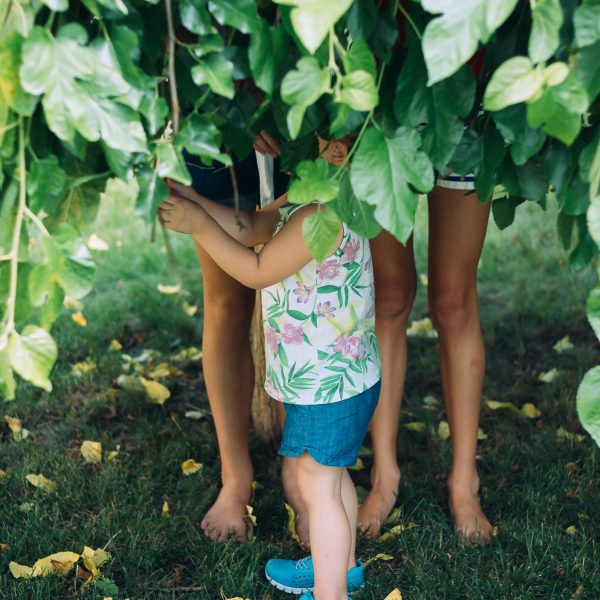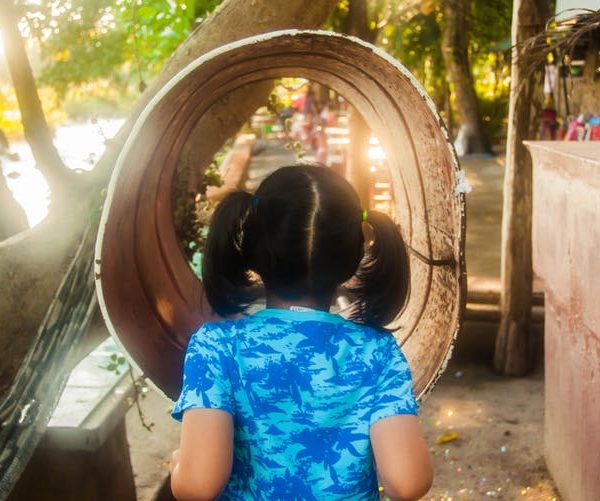One answer to a lack of nature play for older children – Wild Imagination

Like many of our readers, Brooke Davis believes in the wonderful opportunities availed to children of all ages through time spent in nature, exploring, experimenting and engaging in the type of play that is less about rules and structure, and more about developing a sense of self and a chance to answer a favourite question of childhood…I wonder what would happen if…?
Frustrated by not arriving at a response to a ‘niggling question’ of ‘How are children going to care about the environment and look after our planet if they spend a decreasing amount of time connecting to nature?’ and driven by concerning statistics such as “watching TV or videos out of school hours remains the most common recreational activity of children aged 5 to 14 years (98% of children)” she knew something had to be done.
Brooke recently spoke with The Sector about what she terms “the vast deficit of nature in what is offered by many outside school hours care (OSHC) programs”, her desire to get more children immersed in the natural environment, and to offer an alternative to traditional vacation care, where parents could head to work and their children could be at a nature based school holiday program.
Interviewee: Brooke Davis, Founder
Organisation: Wild Imagination
Date: 21.06.19
Topic: nature play, child led exploration, business creation
Freya: Thanks for speaking with us Brooke. Can you tell me about where the idea for Wild Imagination’s programs and offerings came from?
Brooke: Most people are surprised to find out that I’m not a teacher. My career before I started Wild Imagination was in marketing and events including running my own marketing consultancy.
Nature play is a passion and something I did often with my own children. But in 2016, I decided to start a nature play program because I saw there was a need for children to be outdoors and connecting to nature, especially school aged children.
In Adelaide, there were plenty of opportunities for pre-school children to get into nature, and more childcares and kindergartens were embracing the nature play philosophy. However when children reached school age, those opportunities for free play in nature were greatly reduced. I saw the vast difference between my childhood and the one my children were experiencing and I wanted to do something about it.
Freya: How did you choose your business name? What were you hoping to symbolise with the name Wild Imagination?
Brooke: I wanted to capture the essence of nature play – it’s all about being in the wild and being creative. I also liked that it is used in a phrase for creative children “oh my, you have a wild imagination!”
Freya: What do you think is behind the decline in children accessing natural spaces?
Brooke: I think there are a few reasons why children, especially those in the OSHC age group, are accessing less nature.
A big factor is that we lead busier lives. This applies to adults, who are working more than ever, and children, who are attending more extra curricular activities and live much more scheduled lives than children did even a couple of decades ago. Often children will spend most of their outdoor time playing sport, and not engaging in unstructured outdoor play.
Backyard sizes have reduced as well, and less wild space is available for children to play in. Similarly, parents are less inclined to allow children to ‘roam’ around the neighbourhood as we used to when I was a child.
I do think it is a real concern, because if children are spending a decreasing amount of time in nature, how will they develop a connection and care for the environment?
Freya: What’s your favourite thing about working with educators, children and nature?
Brooke: For me, the best things about Wild Imagination are seeing the joy in the children’s eyes when they master something ‘tricky’, and the pride they show when they have made something entirely unique to their imagination.
I also love speaking with educators and often hearing about their surprise at how the children behave and interact differently when in a natural outdoor setting. It’s always positive and uplifting, and makes me want to continue to spread the joy of nature play to thousands more children.
Freya: If you could communicate one message about nature play to outside school hours care (OSHC) educators, what would it be?
Brooke: Nature play doesn’t need to be complicated and elaborate. Keep it small and simple in the beginning and grow it over time. You will be surprised about the flow on effect of nature plays into other aspects of learning. It’s been proven that just looking at nature improves wellbeing and reduces anxiety.
Freya: I understand you’ve compiled some of the things you’ve learnt about Nature Play into a book. Can you tell us more about the new book, the kickstarter campaign, and what you hope to achieve?
Brooke: The book is a collection of nature play activities that have been tried and tested at the Wild Imagination program. It’s not like any other nature play activity book that I have seen, in that it is mostly images and doesn’t have step-by-step instructions. The instructions that are provided are a guide to essential information, but each activity is open ended to allow for individual imaginations to create what they want. That’s why it’s called Your Wild Imagination! I envisage the book would be used worldwide, in homes and classrooms. Most of the activities can be easily adapted to suit a class or OSHC group.
We are using Kickstarter to crowd fund for the first print run of the book. I aim to raise $30,000, which is enough to cover the printing of 1,000 books and distributing them out to our supporters from the Kickstarter campaign. The book is beautiful quality, hard cover with more than 120 full colour pages printed on sustainably sourced paper.
We need to reach our goal before 1 July or no money changes hands and no books get printed!
Freya: Can you give our readers some hints and tips about the best way to bring more natural elements into their programs?
Brooke: The simplest way to start to incorporate nature in classrooms and OSHC programs is through art, and there are plenty of examples on how to do that in my book as well as online.
My three main tips are;
- Start simple and provide trust in your students that they will act appropriately with materials that might usually be off limits, such as large sticks.
- Experiment with using nature in other areas of the program, like using gum nuts to help with maths homework, or just sit outside and read with children a couple of days per week.
- I promise if you stick with it you will notice a difference in the children’s wellbeing and learning outcomes.
Freya: What’s on the horizon for Wild Imagination?
Brooke: This year we have an OSHC excursion program planned for October holidays, and that’s also when the book will be published! The supporters from our Kickstarter will receive their books in October and we’ll spend the rest of the year partnering with councils, businesses and schools to get more kids playing in and with nature.
Longer term I hope to create more nature play books for kids of different ages and even adults!
For more information about Wild Imagination, see here. To learn more about the Kickstarter campaign, or to order a copy of the book, please see here.
[ENDS]
Popular

Economics
Policy
Provider
Workforce
Prime Minister Albanese backs Tasmanian Labor’s childcare plan, highlights national early learning progress
2025-06-30 10:42:02
by Fiona Alston

Events News
Marketplace
Practice
Provider
Quality
Research
Workforce
How do you build and keep your dream team? ECEC Workforce and Wellbeing Forum tackles the big questions
2025-06-24 15:20:53
by Fiona Alston

Economics
Provider
Quality
Practice
Policy
Workforce
South Australia announces major OSHC sector reforms aimed at boosting quality and access
2025-06-30 09:49:48
by Fiona Alston












